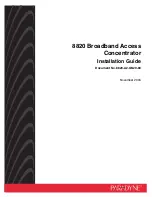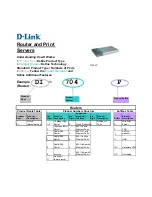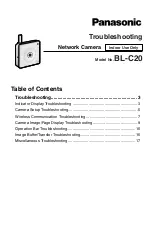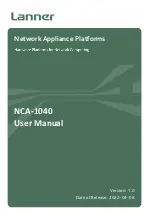
1. Overview
1.1. Introduction
e GRouter (GR4) router supports two open standard protocols, namely ANSI/EIA 709.1 and
ANSI/EIA 852. Both the ANSI/EIA 709.1 and ANSI/EIA 852 are defined by the Consumer
Electronics Association Technology & Standards R7.1 HCS1 Subcommittee. For more details see
http://ce.org/
. For the sake of brevity the remainder of the document will refer to the
standards as 709.1 and 852. 709.1 is also known by its trademarked name, LonTalk
®
. A 709.1
network is also commonly referred to as a Local Operating Network or LON. is document will
use 709.1 network and LON interchangeably.
e 852 protocol acts as the transport service to convey 709.1 messages over
Internet Protocol
(IP)
networks. is technique of using another protocol (i.e. 852) to transport a message over an
alternate media is oen referred to as
tunneling
. In 852 parlance the tunneled protocol is a
Component Network
(CN) protocol. e 852 protocol is a generic tunneling protocol and is not
limited to 709.1. However, a particular implementation of the 852 protocol may only support the
tunneling of a single CN protocol. e tunneled CN messages have no information or awareness
of the tunneling process. Although some of the figures in this document use CN or CN/IP to
represent a component network or component network to internet protocol connection, the only
CN currently supported by the GRouter device is 709.1
A component network protocol is oen called a fieldbus due to its use for machine to machine
networking and control in the
field
. is document, however, will only use the term component
network or CN.
852 not only provides the vehicle to transport ANSI 709.1 messages across IP, but it also provides
management of these connections or routes. A logical grouping of 852 devices that exchange
packets is called an 852 channel. One may think of an 852 channel as a kind of
virtual LAN
on an
IP network.
A GRouter device forwards 709.1 packets to or from an IP channel (using an Ethernet or WiFi
transceiver) and a CN channel (using twisted pair FT-10 or RS-485 transceivers). e GRouter
device has a presence on, or physical connection to, both channels. e router takes 709.1
messages from the component network, wraps them in an 852 packet and sends them over the IP
network. e GRouter device also receives 852 packets on its IP interface, unwraps them and puts
the 709.1 messages on the CN channel. e virtual 852 channel looks like a CN channel to CN
nodes. e IP element is transparent. is enables a flat network and is more easily managed and
scaled than using CN to IP interfaces that do not hide the IP element from the CN nodes. e
important thing is not what the CN to IP device is called but how transparent it makes the IP
network appear to the CN nodes.
Network connection devices can operate at different layers of particular networks protocol stack.
709.1 is an OSI 7 Layer type protocol. Whereas the Internet Protocol has only 4 layers. (See Figure
Figure 2.1 for a diagram of the different layers of the two protocols.)
-7-
Summary of Contents for GRouter4
Page 25: ...Fig 2 8 Status Page 25...
Page 26: ...Fig 2 9 Status Page with Bridge and Twin Mode Enabled 26...
Page 42: ...Fig 2 19 Group Forwarding Table 42...
Page 57: ...Fig 3 4 Side A Channel List Page in Manual Mode 57...
Page 72: ...Fig 4 2 Initial LonMaker Drawing Fig 4 3 Router Channel Setup 72...
Page 78: ...Fig 4 10 New Virtual Functional Device Dialog Fig 4 11 Functional Blocks NV Shapes Dialog 78...








































